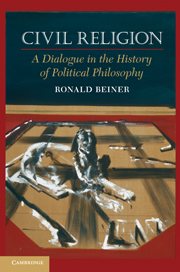Book contents
- Frontmatter
- Contents
- Preface and Acknowledgments
- Introduction
- Part I Machiavelli, Hobbes, Rousseau
- Part II Responses to (and Partial Incorporations of) Civil Religion within the Liberal Tradition
- 9 Baruch Spinoza
- 10 Philosophy and Piety
- 11 Spinoza's Interpretation of the Commonwealth of the Hebrews, and Why Civil Religion Is a Continuing Presence in His Version of Liberalism
- 12 John Locke
- 13 “The Gods of the Philosophers” I
- 14 Bayle's Republic of Atheists
- 15 Montesquieu's Pluralized Civil Religion
- 16 The Straussian Rejection of the Enlightenment as Applied to Bayle and Montesquieu
- 17 “The Gods of the Philosophers” II
- 18 Hume as a Successor to Bayle
- 19 Adam Smith's Sequel to Hume (and Hobbes)
- 20 Christianity as a Civil Religion
- 21 John Stuart Mill's Project to Turn Atheism into a Religion
- 22 Mill's Critics
- 23 John Rawls's Genealogy of Liberalism
- 24 Prosaic Liberalism
- Part III Theocratic Responses to Liberalism
- Part IV Postmodern “Theism”
- Conclusion
- Index
- References
17 - “The Gods of the Philosophers” II
Rousseau and Kant
Published online by Cambridge University Press: 05 June 2012
- Frontmatter
- Contents
- Preface and Acknowledgments
- Introduction
- Part I Machiavelli, Hobbes, Rousseau
- Part II Responses to (and Partial Incorporations of) Civil Religion within the Liberal Tradition
- 9 Baruch Spinoza
- 10 Philosophy and Piety
- 11 Spinoza's Interpretation of the Commonwealth of the Hebrews, and Why Civil Religion Is a Continuing Presence in His Version of Liberalism
- 12 John Locke
- 13 “The Gods of the Philosophers” I
- 14 Bayle's Republic of Atheists
- 15 Montesquieu's Pluralized Civil Religion
- 16 The Straussian Rejection of the Enlightenment as Applied to Bayle and Montesquieu
- 17 “The Gods of the Philosophers” II
- 18 Hume as a Successor to Bayle
- 19 Adam Smith's Sequel to Hume (and Hobbes)
- 20 Christianity as a Civil Religion
- 21 John Stuart Mill's Project to Turn Atheism into a Religion
- 22 Mill's Critics
- 23 John Rawls's Genealogy of Liberalism
- 24 Prosaic Liberalism
- Part III Theocratic Responses to Liberalism
- Part IV Postmodern “Theism”
- Conclusion
- Index
- References
Summary
As soon as peoples took it into their heads to make God speak, each made Him speak in its own way and made Him say what it wanted. If one had listened only to what God says to the heart of man, there would never have been more than one religion on earth.
– Jean-Jacques Rousseau[T]he “Profession of Faith of the Savoyard Vicar”…may one day make a revolution among men.
– Jean-Jacques RousseauOur age is, in especial degree, the age of Kritik, and to Kritik everything must submit. Religion through its sanctity, and law-giving through its majesty, may seek to exempt themselves from it. But they then awaken just suspicion, and cannot claim the sincere respect which reason accords only to that which has been able to sustain the test of free and open examination.
– Immanuel KantIn Chapter 13 I began a survey of leading attempts to replace revealed religion with versions of natural religion as conceived by philosophers, not prophets – a theoretical enterprise that arose in the seventeenth century and culminated in the nineteenth. I now resume that narrative.
The next major work in this tradition (that is, the tradition of those who attempted to use philosophy as a lever by which to pry religion away from dogma, intolerance, and theocratic orthodoxy) is Rousseau's Emile. One of the main reasons Rousseau's work is so intriguing is that he is both a severe critic of the liberal philosophy of politics and life and himself a part of the liberal tradition; he is both a critic of Enlightenment and himself an Enlightener. He is both the author of the vehement critique of modernity in the Discourse on the Sciences and Arts and the author of the liberal theology in Book 4 of Emile. Rousseau was the author not of a single coherent political philosophy but of several mutually incompatible political philosophies. The key line in his work is this: “Common readers, pardon me my paradoxes. When one reflects, they are necessary.” That is, life itself is paradoxical, and the chief vocation of the theorist is to give expression to this paradoxicality. As he put it in his letter to Voltaire of August 18, 1756 (“Letter on Providence”), life does not admit of a single existential catechism. There are at least two – the catechism of man and the catechism of the citizen – and it is impossible to live one's life simultaneously according to both catechisms. In Part I of this book we pursued a dialogue with his catechism of the citizen; now let us look briefly at his catechism of man.
- Type
- Chapter
- Information
- Civil ReligionA Dialogue in the History of Political Philosophy, pp. 205 - 228Publisher: Cambridge University PressPrint publication year: 2010



